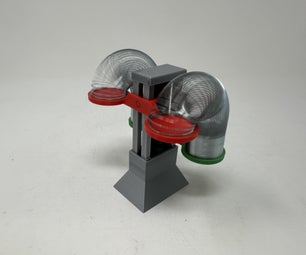Introduction: My Injection Molding Project!
For the last six months, I've been working on a series of injection molding projects to reclaim plastic. Unfortunately, I was too busy actually building them to document them in Instructables fashion. I did, however, make videos of the different phases of the project. I am not done by any means, but this project is so popular on YouTube (and with only two other homebrew injection molders here) I figured I better post it sooner than later.
Here are the phases of the project.
- The Prototype
- Working out the Bugs
- Making a Mold
Step 1: Tools & Materials
You will see me use tools in these projects that are not very common like a metal lathe and a milling machine. I want to point out that these projects can still be built with far less. For instance, turning a bar down can be accomplished with a hand drill and sandpaper. Improvise!
Tools
- Saw for cutting metal
- Drill and bits (Drillpress is handy, but not necessary)
- Centerpunch
- Files
- Caliper
- Tape Measure
- Volt/Ohm/Amp Meter
- Wire Stripper
Materials
- PID Temperature Controller (this is the one I used http://amzn.to/2hnsq6b)
- Two 300 Watt Band Heaters (these are the ones I used http://amzn.to/2yv8Ls6)
- Aluminum Tube for the melting chamber (I used 1¼"OD x ¼" wall)
- Aluminum bar for the piston (I used ¾")
- Aluminum angle for the framework (I used 1¼" x 1¼" x ⅛")
- Aluminum flat bar for connecting rods (I used 1" x ⅛")
- Aluminum flat bar for compression lever (I used 1¼" x ⅜")
- Material to clamp the melting chamber (I used stainless steel U-bolts)
- Hardware to bolt it all together (I used ¼-20 stainless nuts and bolts)
- An enclosure to hold the PID controller and SSR (I used a laser cut box a friend made for me, but a generic project box like this would work fine http://amzn.to/2ib4wMd)
- Power cord
Step 2: First We Built the Prototype
We started out with this 600 Watt heating system and built a framework to hold it all together. All of this could be done with a hand drill and a hacksaw in a pinch. The biggest issue is going to be the interface nozzle between the melting chamber and the mold. If I didn't have a lathe, the way I would make it is by tapping threads into the end of the melting chamber for a commonly available plumbing fitting.
Step 3: Next, We Worked Out the Bugs
We encountered some problems in the first iteration of the machine, but they weren't insurmountable, so we made some adjustments and tried it out. The machine worked!
Step 4: Make a Mold and Cast a Part
Finally, we searched for a way to make a usable mold. In this first effort, we used plaster of the type they use in ceramics. While the effort did produce a good reproduction of the original, the mold was destroyed in the process. We have other efforts in progress. One is to produce a master on a 3D printer and sand cast a mold from pewter. That will likely be the next video. After that, we intend to send that same master file to a CNC milling service to carve the mold from aluminum.

Participated in the
Metal Contest 2017













